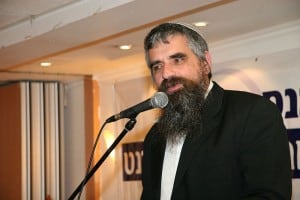
Credit: Yoni debest via Wikipedia Commons
Part II: Rabbi Blau on Religious Justifications for Abuse
Part IV: Dr. James Cantor on Pedophilia and the Brain
On December 1, 2014, I attended the first day of “The Jewish Community Confronts Violence and Abuse.” The three-day conference in Jerusalem, sponsored by the Tahel Crisis Center for Religious Women and Children, focused mainly on spousal abuse including get refusal, and child sex abuse. I found it heartening to see so many people from Jewish communities around the world dedicated to the prevention and treatment of abuse.
The session with Rabbi Yosef Blau and Rabbi Yuval Cherlow, “Religion: The Solution or the Problem?”, was packed with both men and women. Rabbi Cherlow, head of the hesder yeshiva in Raanana, pointed out that the numerous sources in Judaism that promote peace and shalom bayit, harmony between husband and wife. But, he said, people tend to find God and spirituality in Judaism through things like hafrashat challah (separating dough as a symbolic kind of tithe), lighting candles, and praying, and not things like providing parking spots for handicapped people.
He gave a few examples of Jewish concepts that are misinterpreted in a way that make it difficult to deal effectively with abuse in the Jewish community:
- Judaism’s attitude toward suffering. Judaism relates to suffering as a challenge or a sign of personal guilt. Pain and suffering come from God. We are taught to first look at ourselves when there is a problem before blaming others. So a religious woman might see her husband’s beating her as punishment from God, instead of seeing the violence as the problem.
- Honor your father and mother. Rabbi Cherlow maintains that the main requirement of this commandment relates to adult children caring for their elderly parents. It does not give parents the right to control their children with violence or threats. Rabbi Cherlow is frequently asked whether one is obligated to honor parents who were emotionally or physically abusive. In these cases, the children are not required to accede to their requests or have a relationship with their parents. In these extreme cases, it is enough to fulfill the commandment, “Honor your father and mother,” by not treating them with contempt (lo levazot otam).
- Prohibition against slander (lashon hara). According to Maimonides, the law of slander is a serious sin and applies even if the allegations are true. This is a big barrier to treating abuse. However, the Hafetz Hayim rules that the prohibition does not apply if relaying the negative comments will prevent future harm.
- Prohibition against Chilul Hashem (desecration of God’s name). If it is widely known that there is violence among religious Jews, this could reflect badly on God and His commandments. But Rabbi Cherlow asks whether God would want kiddush Hashem, the sanctification of His name, at the expense of victims? The answer is clearly no.
So what is our challenge? According to Rabbi Cherlow, we must not allow anyone to turn Judaism’s lofty values into a double-edged sword. Don’t stand by your neighbor’s blood. It’s possible to take any religious principle and use it to justify the greatest injustice. When teaching the laws of slander and honoring parents, include the instances when these commandments don’t apply as well as when they do.
See Part II: Rabbi Blau on Religious Justifications for Abuse
Thanks for sharing this important summary. What did Rabbi Blau have to say?
I plan to write that up next. Thanks for asking.
It appears that Christian church will also be on the look-out for abuse in the religious communities http://www.wartburgwatch.com is an example. It appears that some of the “abuse” allegations are simply people who refuse to forgive. However, there are TRUE dangers that can exist because of religious belief like a story in America about Jim Jones…..
I believe personal belief is a healing to the body, spirit and soul in our cruel world. It is a matter of how one handles community that is another factor that may pose potential for abuse, but can be a blessing if handled appropriately especially of women and children.
Yay, finally someone who is willing to say, in public, that I don’t have to have a relationship with my mother of any sort, including nice phone conversations during which she wants updates and information, and halacha doesn’t obligate me to.
I think I will try to find (if it exists) a place where Rav Cherlow himself wrote this, and then send the link to any family member who starts pressuring me again (if they do – last time someone tried pressuring me I semi-ex-communicated them).